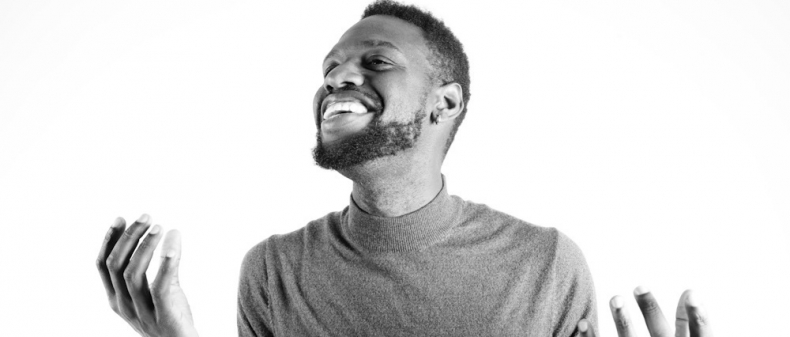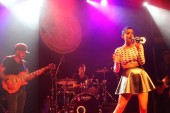
You could take a label gun to Anthony Russell and just go to town: He’s a gay, black, Jewish convert, both religiously and musically. Just don’t call him a New Yorker. Anthony’s career transformation has followed a similar trajectory to his personal one, and saw him leave behind an interest in opera to become the next big name in Yiddish music. Of course this combination of identities is perfectly natural to him, and only appears strange or news-worthy from an outsider’s perspective. “I didn’t consider myself to be an anomaly, but now I realize I am an anomaly,” he admits. And yet, the state of Anthony’s identities are far from in crisis. Anthony weaves his identities together with incredible ease, and along with his music, they begin to inform one another.
Anthony Russell has a way of externalizing stereotypes and identities, of making them visible on the surface for immediate dissection. Any one individual possesses just as varied a list of identities (can I really be both an animal lover and a Burger’s Priest lover?), though perhaps not in the exact same combination. He raises a number of important questions about the mutual exclusivity of identities: does a strong Christian belief negate a Jewish one? Can a gay man devote a large portion of his life to religion? Can one’s race exclude them from achieving a cultural authenticity?
As a Jew myself, I think that Judaism is particularity interesting in discussions about religion, culture, and identity. I’ve considered myself a Jew my whole life, and would not accept claims to the contrary. That said, I would currently call myself atheist, have little to no religious education, and rarely interact with Judaism in a religious context. And yet I still look and act the part: I have olive skin, I went to sleep-away camp, and I have bushy brown hair that even Pantene Smooth & Sleek can’t tame. Yet nobody questions my Jewish-ness, and apparently everyone Anthony’s. Explains Anthony of his first show, “this room [was] filled with mostly Jewish people, and they were watching this gay black guy get up and sing in front of them in Yiddish. Man, they had a lot of questions. It got to this critical point where they just had to ask their questions.”
French film theorist Edgar Morin (bear with me here) talked about film’s ability as a medium to induce a universal projection-identification amongst its viewers. To keep this short, he discussed film’s ability to connect to its audience on two levels: first though projection, as the viewer externalizes their internal thoughts and emotions onto the work in front of them. Second, through the process of identification, in which the viewer latches onto a familiarity from the external work, and brings it into oneself internally. Oddly enough, Anthony’s epiphany of sorts occurred as he was watching a film; The Coen Brother’s A Serious Man. He explains, “I initially came to Yiddish because I heard the singer Sidor Belarsky in A Serious Man… suddenly my connection with this Yiddish singer opened up a whole world of music for me.”
Anthony goes on to explain how being a minority (or three or four) completely changed his outlook on art through these dual processes of projection and identification. He explains, “there’s a quality of being a minority, and of expressing oneself as a minority, that often takes on the form or projection… I would say, in that way, my identity as black person, as a gay person, as a Jewish person, it has definitely been informed by this act of projection. ” The interaction between his various identities have clearly changed his relationship to these works of Yiddish song, proving that this projection-identification process is not just limited to the medium of film. This interaction with media through the lens of being a minority has been proven over and over again. Anthony himself points to gay men and the opera Tosca, though I could expand the list to gay culture’s seemingly arbitrary connection with Judy Garland, Madonna, and good ol’ American cowboys.
Anthony Russell’s identities and interests all share the common thread of community, and of coming together to group disparate elements into something larger. “It’s fascinating because there’s an interesting parallel between being Jewish and being gay… I didn’t know that gay people at large… had anything in common with me… In the same way, I felt this immense amount of connection to the people and the narratives in the bible, but it didn’t occur to me that I could just go to a synagogue and meet a Jew if I wanted to.” What seem like disjointed elements of Anthony’s life are actually intimately related.
You can hear Anthony’s story and his music this Wednesday, June 19th for the Annual Summer Yiddish Concert at the Randolph Theatre, and again this Thursday, June 20th for the Moses Znaimer’s IdeaCity Conference at Koerner Hall. Read below for an extended version of the interview, edited for clarity and length considerations.
You had a pretty religious childhood – a Christian one if I’m not mistaken. What sect of Christianity do you come from, and what did it mean to you then?
Protestant, initially. My family went to a Baptist Church, and then we went to a Pentecostal Church. In both churches singing was a really important thing, and something that I always enjoyed, but never considered a potential way of life. There’s a quality of an autodidact that I have, I really like to learn things. I was an unusual child in that I was convinced that if I saw something on television that interested me, I went directly a library ad started reading about it, which is a little bizarre. I felt the exact same way about my belief. I had been brought up in the Christian belief, and wanted to know more about the bible, so around age 8 I just started reading it; reading through the bible, and reading about the bible. It got to the point that I became very personally invested in the narratives. They became the frame upon which I hung my life.
Then how did your interest in Judaism begin?
My interest in Judaism is basically as old as my interest spirituality. When I was reading the bible I was there educating myself on a lot of what the main texts are in the Jewish religion. So I’d always been interested in Judaism from a very young age. I felt this affinity for Judaism, but it was nothing that when I was younger I actively sought to find out about. That is, until, I met a rabbi, who’s actually my boyfriend. I went out on a blind date with him at a Mets game. I thought hmm, let me find out what this whole thing’s about, and… here I am.
I initially came to Yiddish because I heard the singer Sidor Belarsky in A Serious Man and what I heard initially was his voice – how deep it was an how beautiful it sounded – thought I thought it was Paul Robeson. They have a lot of the same qualities, the same vocal timbre. Suddenly my connection with this Yiddish singer opened up a whole world of music for me.
The first thing I read about was an article with the headline “Black, Jewish, Gay Opera Singer is the ‘New Voice of Yiddish Song.'” Those are a lot of labels thrown around. Do you think all of these identities factor into your art and performance?
I’ll say this: There’s a quality of being a minority, and of expressing oneself as a minority, that often takes on the form or projection. So you take whatever the going form of cultural expression is, and you project yourself onto it, and make it into your own image. So when Jews came to the United States, they saw what was going on on Broadway, and projected themselves into it, and made their own version on top of it. Or they would do productions of Shakespeare, but they would do them in Yiddish. So instead of King Lear being a king, he would be a Rabbi of a rabbinical dynasty, and his daughter would be a Rabbi’s daughter. They took the cultural forms, and projected themselves onto it.
It’s a thing that African-Americans did, it’s a thing that gay people do to this day. It’s a way of engaging with culture, and also using that culture to express yourself. There’s a quality of that in what I’ve managed to do with Yiddish. I’ve taken these songs which have an immense amount of context, and have kind of woven myself into their context. I’ve managed to take these stories and these narratives and somehow make them, in part, about myself. And it’s a very conscious act. I can speak from experience, when a gay man goes to see Tosca – I mean what does a gay man have in common with Tosca? It’s this Italian opera where this girl falls in love with an artist and throws herself off a building. But there it is, you have people who are able to see these cultural products, and they projects themselves, it becomes this kind of synthesis of who they are. I would say, in that way, my identity as black person, as a gay person, as a Jewish person, it has definitely been informed by this act of projection.
I’m curious about the evolution of these identities within yourself. You were born black, you sooner or later came to realize you were gay, and the only identity you were really able to choose was your Jewish one. Did any of the first two identities somehow inform, or lead to the third?
It’s fascinating because there’s an interesting parallel between being Jewish and being gay. So when I was a relatively young child, I would say six or seven, I began realizing I’m attracted to men. It wasn’t this big thing that I felt I needed to hide from anyone, or I didn’t feel bad myself. I didn’t suffer the way a lot of people do when they come to grips with their sexual identity. But, being a child, I didn’t know that gay people at large (like the people you’d see at a Pride parade) had anything in common with me. I knew that I was attracted to men, and that was it. And then there were these guys over there who were on floats half-naked, and I didn’t realize that there was any connection between the two.
In the same way, I felt this immense amount of connection to the people and the narratives in the bible, but it didn’t occur to me that I could just go to a synagogue and meet a Jew if I wanted to. That I could go and meet someone whose life was informed by the people I loved so much from these narratives; the people that I invested myself to, and projected myself over. It didn’t occur to me that could talk to people about all of these things that I was obsessing about constantly.
What’s it like living with a Rabbi?
It’s good in the sense that if I need to know anything about the great panoply that is Judaic civilization, there he is. He’s got books up to the ceiling. But it’s also hard because he’s constantly working to give to his community. It’s funny, a lot of people are like oh, you converted, that must have been so hard for you, there must have been so much you had to learn. I came to the table already knowing a lot, and then I spent a number of years living with a Rabbi.
I don’t want to be too crass, but if you really want to learn a lot about Judaism, you can sleep with a Rabbi too, and soon you will know as much as I do. If you ever wanted to know how to learn everything there is to no about Jewish civilization, that’s how to do it. I think this was integral to my journey as a Jew. I lived with Michael, I celebrated all of the holidays with him, I cleaned up the house for Pesach (which is no small thing), his mother but me a Sukkah and we had people over. I did all of these things, and the life that we lived was a very Jewish life. So when it was time for me to go to another Rabbi and say I would like to convert to Judaism, it wasn’t like I didn’t know anything. I had done everything except for formally convert.
Tell me about your upcoming shows.
I had this interesting experience last year at the Ashkenaz Festival… it was this room filled with mostly Jewish people, and they were watching this gay black guy get up and sing in front of them in Yiddish. Man, they had a lot of questions. It got to this critical point where they just had to ask their questions. “How did you become Jewish?” “How did you become Yiddish?” I didn’t consider myself to be an anomaly, but now I realize I am an anomaly.
Over the past year I’ve had a lot of people ask me a lot of questions. Some of them have been great questions, some of them have been terrible questions. I took their questions, and turned it into a show. So every kind of question you could possibly imagine: “Is your mother Jewish? Are you an Ethiopian Jew?” If you’ve ever seen an Ethiopian, and you’ve ever seen me…Anyway. I take questions like that, and I answer them through the course of the show. But I also answer these questions through the songs I choose, which have to do with me, and my story as well. So I’ve tried to make it very integrated, and I hope that by the end of the show people know more about me, and Sidor Belarsky, and Yiddish music.
One of the first questions I answer is “was your mother Jewish?” and I answer no, she wasn’t. And then I go on to sing this song about childhood memories, and this person goes on to talk about how they miss their mother, anyhow they miss the place they grew up. It’s kind of like I’m taking my story and folding it over onto the stories of these songs, and eventually they inform one another.
Sounds like a Jewish mother to me.
Last year at the festival this woman came up to me and asked “Do you live in Canada?,” to which I responded no. She told me, “That’s too bad, I have this niece who needs a good Jewish man,” and I was like are you kidding me? Man, she was ready to make a love connection. I was like, lady, you’re barking up the wrong tree.
God, I hope it wasn’t my mother.
————
Jeremy Schipper is an intern at Toronto Standard. You can follow him on Twitter at @jeromeoschipps.
For more, follow us on Twitter at @torontostandard, and subscribe to our newsletter.














